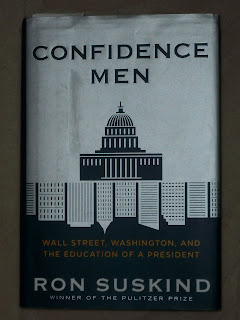Summer Reading II: Confidence Men

........Suskind has made news again, and the news he has made is bad news for, and about, Barack Obama. During the early months of Obama’s Presidency—“Confidence Men” covers the first two years—his White House, Suskind says, was a testosterone-fuelled boys’ club where important female staffers and agency heads felt bullied and ignored by their male colleagues. “Friction over the role of women in the Obama White House grew so intense,” the Washington Post wrote, summarizing Suskind, that the President “was forced to take steps to reassure senior women on his staff that he valued their presence and input.” And the troubles went far beyond gender, distorting the economic policymaking that is Suskind’s focus. The Times: “A new book claims that President Obama’s response to the economic crisis was hampered by a White House economic staff plagued by internal rivalries, a domineering chief adviser and a Treasury secretary who dragged his feet on enforcing decisions with which he disagreed.” The domineering chief adviser is Lawrence Summers, since departed as the director of the National Economic Council, who, Suskind writes, stage-whispered “Home alone” after meetings with the President and confided to a colleague, “There’s no adult in charge.” The Treasury Secretary, still there, is Timothy Geithner, whose department, in Suskind’s hotly disputed telling, refused to carry out a Presidential order that Citigroup be overhauled.
- Read in full, “Confidence Men” is a detailed narrative of the Administration’s response—sometimes frantic, sometimes sluggish, sometimes both—to the financial and economic catastrophe it inherited, as experienced from the inside. It has the virtues and the limitations of its Woodwardian genre: contemporary, still unfolding history, filtered through the aesthetic conventions of the mass-market novel. That means an omniscient, seemingly eyewitness, mind-reading narrator; an irresistible penchant for conflict and drama; and a linear, character-driven story. (In this genre, the author’s most loquacious sources seldom harm their chances of being cast as heroes rather than as villains.) It’s a type of nonfiction that might be labelled, with only a little exaggeration, “Based on a True Story.” Analysis, background, and exposition necessarily take a back seat to action. Yet Suskind, without stanching the flow of his tale, is able to elucidate how it came to pass that the Reagan-through-Bush II reign of financial deregulation, along with cybernetic chicanery, defective and incomprehensible financial “products,” and banking greed unmoored from social, personal, and fiduciary responsibility, created a monstrous “debt machine” that turbocharged inequality of wealth, inflated bubbles, diverted talent and investment from making things to making bets, bilked millions on the edge to enrich thousands on the heights, and ended—if it ended—by pushing the poor, the middle class, and the real economy into the abyss.
“Confidence Men” offers support for some of today’s standard progressive gripes about the President, and for a few of the conservative ones. Obama was green, and not just environmentally. He had no managerial experience, while his only Washington experience was two active years in the Senate—and it showed, at least inside the West Wing. He made Rahm Emanuel his chief of staff instead of Tom Daschle, who, besides engineering quicker passage for a better health-care bill, might have tamed the policymaking chaos of raging staff egos and Presidential reticence. For the highest economic posts Obama picked Geithner and Summers, who were implicated in the deregulatory status quo and wary of fundamental reform—Team B, Suskind calls them—while passing over Team A, the heterodox skeptics, such as Paul Volcker and Austan Goolsbee, who had guided him through the campaign, when his prescience about the coming crisis and his sureness when it struck had sealed his November victory. Team B underestimated the severity of the economic debacle. For that reason—and also to woo conservative congressional Democrats and, futilely, Republicans—Obama’s stimulus proposal was too small and too larded with relatively ineffectual tax cuts. Had he demanded more but still got only what he ended up with, he might have received more credit for forestalling a depression and less blame for the feebleness of the jobless “recovery.” Chronically, within the White House and on Capitol Hill, he sought consensus as a starting point—the tranquillity of resolution without the catharsis of conflict.
“On the way to his inauguration, Obama got word that Republicans in the House had committed, as a bloc, to oppose his stimulus plan,” Suskind writes. A few pages later, he describes the newly sworn-in President as “a man with little experience wielding power but the fastest of learners.” The fastest? Not always. Obama took the oath of office determined to change the way things were done in Washington, by which he meant a turn toward civility, comity, coöperation, and mutual respect—honest debate and earnest, public-spirited compromise. He did not grasp how profoundly the transformation of the Republican Party into a disciplined, nearly monolithic agent of radical reaction and ruthless obstruction—a transformation that has only accelerated since that day—had changed things already. Perhaps he did not wish to grasp it. In recent weeks, though, he has surprised disdainful opponents and dispirited supporters alike with the passion and firmness of his drive for urgent job spending, responsible debt reduction, and equitable taxation. A President may learn more from the frustrations of power than from the wielding of it. But in this President’s case the learning has been perilously slow. ♦
Comments